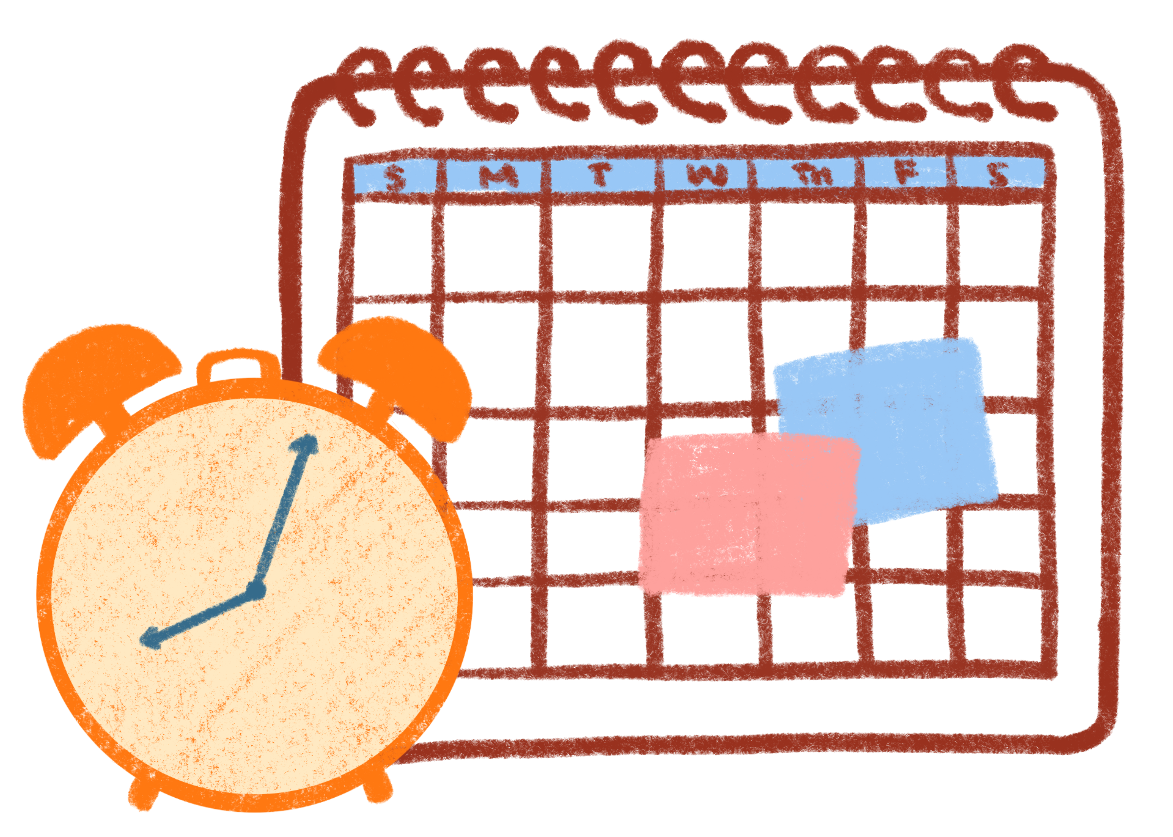One weekday morning last September, Weinberg third-year Timothy Lin woke up, confused, with the carpet of University (Main) Library pressed against his cheek. Momentarily, he wondered how he had ended up there. Remembering two looming finals and 17 hours worth of weekly shifts at his two jobs, his confusion waned. Slowly, he rose to start his day.
“I stayed up all night. I passed out on the library floor,
and I got up and I just had a series of mental breakdowns the next day at 9 a.m.,” Lin says.
“It was so, so much.”
 As a participant in the Federal Work-Study (FWS) program,
Lin works to access a portion of the financial aid that helps fund his education and living expenses.
He says his work-study hours can be flexible and acknowledges that they weren’t the sole cause of his
near-sleepless night in the library. But the amount of money in his annual allotment from the
Federal Work-Study Office isn’t enough to meet the cost of living off-campus.
As a participant in the Federal Work-Study (FWS) program,
Lin works to access a portion of the financial aid that helps fund his education and living expenses.
He says his work-study hours can be flexible and acknowledges that they weren’t the sole cause of his
near-sleepless night in the library. But the amount of money in his annual allotment from the
Federal Work-Study Office isn’t enough to meet the cost of living off-campus.
The Federal Work-Study Program, run by the U.S. Department of Education,
offers students need-based jobs on- and off-campus to offset the cost of higher education.
Around 570,000 undergraduate students at 3,078 U.S. institutions depend on annual work-study allotments,
according to the National Association of Student Financial Aid Administrators 2020 report.
Students can work a maximum of 15 hours per week until they earn the amount of money in their annual allotment.
The size of an allotment is dependent on a student’s level of need,
the amount of funding their school has to distribute and when the student applies for financial aid,
as work-study positions are first-come, first-serve.
Approximately 2,000 Northwestern undergraduates — nearly 24% — participate in work studies.
Some reap the intended benefits of the program: Employed in positions related to their studies,
they make money while gaining valuable experience. Others, though,
spend four years grappling with a program they believe requires they give more than they get in return.
Clocking in, missing out
Weinberg third-year Orie D’Angelo, who uses he/him and they/them pronouns, has qualified for a work-study position every year he has been at Northwestern. However, until this spring, his job search was unsuccessful. D’Angelo wanted to work, but available jobs were limited.
Between the winter of his first year and the fall of his second year, D’Angelo applied to several jobs and never heard back from any of them. In January 2020, he sought help from Student Enrichment Services. Staff members recommended he visit the work-study website and apply for positions listed on their open jobs page — exactly what D’Angelo says he had been doing all along.
“I have not done a great job of actively looking for resources that aren’t just the work-study website,” D’Angelo says. “But I wish that there were more easily available resources for getting work-study [jobs]. And then obviously it was frustrating to, for several years, fail to get a job.”
One caveat of the FWS program is that students must find employment themselves. The Northwestern Work-Study Office’s website is explicit: “We do not place students in jobs, nor can we guarantee a job,” it says. While many students have successfully found work-study positions, others who struggle to find employment cannot access their allotted funds.
The Work-Study Office hosts an annual job fair at the start of Fall Quarter to advertise a variety of employment opportunities, from research assistant positions to desk jobs. This year’s fair was virtual, and it was unclear how many positions were available. The Northwestern Work-Study Office declined to comment multiple times.

D’Angelo recalls attending a work-study information session during Wildcat Welcome to learn about job applications. He says that adding onto his schedule at the time, however, felt “completely overwhelming.”
Since beginning his first work-study job this spring as an aide for a Kellogg School of Management assistant professor, D’Angelo says he dropped one of his four classes. The time commitment of his work-study position factored into the decision.
Adjusting to college while working can pose challenges for many students. A 2017 Center For Analysis Of Postsecondary Education And Employment (CAPSEE) study estimated that work-study participation caused a 4% decrease in the GPAs of first-years at private, nonprofit universities.
Work-study students of all years can face difficulty juggling school and work commitments. After four years in the work-study program, Weinberg fourth-year Imani Minor says she’s enjoyed her positions as a Concerts at Bienen employee and a manager for the women’s basketball team. However, one of the drawbacks was less time for activities related to her academics.
“In terms of going to office hours and stuff like that, I wasn’t able to build as much of a rapport with faculty members as I would have theoretically liked to just because I was working,” Minor says.
Communication third-year Anthony Beerswing, who uses he/him and they/them pronouns, has worked at Concerts at Bienen for three years as both an usher and monitor for facilities. Though the pandemic altered their work schedule, a typical work week during their first year involved multiple two to three- hour night shifts, adding up to a total of 14 to 15 hours a week.
“There’s definitely been times where I’ve been at work and I’ve been at some concert or something, and I’ve thought, ‘Oh my god, I have all this homework to do, and I have no time to do it here. I’m going to be at this job until 10, and then I have to stay up and finish all this work after that,’” Beerswing says.
Some students find their financial aid isn’t enough to cover their full need and are forced to balance second or third jobs on top of work-study, schoolwork and other obligations. Lin now works three jobs and up to 25 hours a week between his job at the Global Poverty Research Lab, his tutoring side business and his work-study position as a research aide in the Medill School of Journalism, Media, Integrated Marketing Communications. Lin says his jobs leave him with less time to hang out with friends during the week, limiting his social life. He also had to quit writing for Out Da Box, a sketch comedy group, and volunteering with UStrive, a student mentoring program.
“In terms of career professionalism, I feel like I’m a step behind everyone else because I’m not in all these clubs. I don’t have all these leadership roles,” Lin says. “And a lot of that’s because I’m working.”
Everything kind of hit me like a truck. I missed class a couple times because after working and not taking care of myself, I was just too tired, and I physically could not go to class.
Weinberg second-year Christine Potermin
Weinberg second-year Christine Potermin’s first work-study job was in the prop shop, a labor-intensive position where each shift required her to spend at least two hours on her feet. With juvenile arthritis, an autoimmune disease that causes joint pain, and medicine that causes fatigue, headaches and nausea, Potermin says she worked at the expense of her health.
“Sickness hits really intensely for me because of my chronic illness. I would go to work sick all the time and then be doing manual labor while having a fever,” Potermin says. “I took so many days off from that job because of sickness, and then that meant I didn’t get paid, and then that meant I was stressed about my bills.”
Potermin now works as a tutor and babysitter outside of her two work-study positions as a research assistant in the Center of Communication & Public Policy and the Learning Sciences Department. Her new jobs require less physical labor but more overall hours. Income from all three of her jobs directly funds her living expenses— opting to work fewer hours would be financially straining. During midterms this spring, Potermin says balancing her priorities was particularly overwhelming.
“Everything kind of hit me like a truck,” Potermin says. “I missed class a couple times because after working and not taking care of myself, I was just too tired, and I physically could not go to class.”
These unintended consequences of the FWS program — lack of sleep and time to devote to academics, social life and career pursuits — disproportionately impact low-income Northwestern students, as financial need is a qualification for work-study aid.
“It’s slightly elitist,” Minor says. “Just because the people who need money have to work for it, meaning they don’t have as much time to do other things… At Northwestern, the people who are on work-study typically don’t have as much money as the other wealthier kids, [so] I think that just having more opportunities for them would just be very helpful.”
“A state of limbo”
When the University announced on March 11, 2020 that students would not be welcomed back to campus after Spring Break and would instead take Spring Quarter classes remotely, Lin had no idea what the future of his work-study position would be.
Until April, Lin heard nothing from his employers or the Northwestern Work-Study Office.
“I didn’t know what I would be doing, if I would be doing anything at all,” Lin says. “Their communication was honestly pretty terrible.”
On April 1 — three weeks after the initial decision to close campus — the Office of Undergraduate Financial Aid announced their plans to pay work-study students their Spring Quarter wages.
In place of actual hours worked, they paid students based on the total hours they worked in Winter Quarter of 2020, up to their maximum award. Students were notified of their exact allotment on April 13 and paid one lump sum on the day they would have received their first paycheck.
Once he received his money, Lin was content with the University’s decision. However, for three weeks, he says he was “in a state of limbo.”
Returning work-study students remained unsure of what their jobs would look like in Fall 2020 for much of last spring. Several jobs eventually transitioned to a remote format. Others returned in-person, with restrictions in place. And others, like Potermin’s, disappeared entirely.
Lin’s research aide position in Medill eventually returned to in-person work, but with fewer available shifts and tasks to complete. In their positions at Concerts at Bienen, Beerswing and Minor also returned to an altered schedule. Before the pandemic, they worked multiple short shifts a week. In the fall, shifts were lengthened, but fewer were available per week. Beerswing estimates they worked five more hours each week before the pandemic, and reduced hours decreased the amount they were paid. While Beerswing’s schedule returned to normal hours during Winter Quarter, Minor’s remains altered.
In terms of career professionalism, I feel like I’m a step behind everyone else because I’m not in all these clubs. I don’t have all these leadership roles. And a lot of that’s because I’m working.
Weinberg third-year Timothy Lin
“It’s drastically less time in the office,” Minor says.
For first-year students who weren’t permitted to live on campus in the fall, remote work-study positions were the only option. Weinberg first-year Elizabeth Dudley says she considers her work-study an important portion of her financial aid and applied to multiple remote positions.
When Dudley was accepted to none, she had no way to access her work-study award. Dudley says she remained financially stable in the fall due to income from a part-time job in her hometown, but she made applying to work-study positions in winter a priority. She found available jobs and applied to roughly 10. The problem, she says, was the qualifications these positions required.
“A lot of the positions were [research assistants], which I understand and that’s great for upperclassmen students. But I had completed one quarter of classes, and I had no formal training in any statistical software or any tools, so that took out a lot of the remote pool for me,” she says.
Dudley eventually found a position as a general assistant within Medill’s Integrated Marketing and Communications (IMC) program. She went through the application process on her own, using the Northwestern work-study website’s list of open jobs. She received little direct communication from Northwestern’s Work-Study Office about available positions or how to find them, she says.
“Don’t get me wrong, I’m grateful to have [my work-study], and I’m grateful for the experience,” Dudley says. “But the fact that it’s an expectation, otherwise you lose that money — that can be frustrating.”
The payoff
According to the Brookings Institute, the average Federal Work-Study award in the mid-1970s covered close to 90% of tuition and fees at most four-year public universities. Now, the national average award of $1,550 covers only 16%.
Northwestern’s awards range from $2,200 to $3,300 for the academic year, covering just 3 to 4% of tuition and fees. The allotment is not a salary but rather an earnings limit — if students do not work enough hours to reach their allotment, they do not receive leftover funds.
Reaching this allotment can be difficult. Some students don’t work the maximum 15 hours per week due to the constraints of class schedules. Others can’t work enough shifts to max out on hours because their employers have too many students to schedule and not enough work for them to do.
“The jobs I have aren’t enough hours to fill my allotment, which kind of sucks. And even if they did provide enough hours to fill my allotment, that would just be a lot of hours,” Potermin says. “I don’t hit my allotment, and it’s hard for sure. I do feel the need to compensate in other ways by working outside of work-study.”
Because she can’t work 15 hours each week in work-study shifts alone to access her full allotment, Potermin works closer to 25 weekly hours with the addition of her third job. Without her third job, she says, meeting living expenses would be more strenuous.
Lin’s job allows him to work enough shifts to meet his allotment. This April, when he reached his earnings limit, Northwestern’s Work-Study Office granted him a one-time add-on to his allotment. Lin did not request this add-on because he was not aware that he had reached his award limit, and the Work-Study Office declined to comment. Still, Northwestern’s allotment maximum is not sufficient for him.
Living in an off-campus apartment, Lin’s rent with utilities costs $600 a month. His work-study allotment, he says, covers less than seven months of his annual rent.
“Maybe this is a very uniquely me thing, and there’s nothing Northwestern can do about this. I just wish they would increase the allotment a bit,” Lin says. “I do it because it’s part of my aid package, and I do it to get the money, but it’s not a lot of money.”
Nationally, the FWS program is intended to primarily serve low-income students. The allocation of funds, though, disproportionately benefits high-income students and private four-year universities. These institutions receive 38% of work-study funds, but enroll only 14% of all undergraduates, according to a CAPSEE report. A Washington Post analysis shows that private university students in the highest income bracket are more likely to receive work-study funds than community college students in the lowest income bracket.
Another goal of the FWS program is to offer work experience that connects to students’ academic and career aspirations. Some students, like Medill first-year Mikayla Denault, have benefited greatly from professional development in work-study positions.

Denault, a first-year work-study student who was able to find remote employment in fall 2020, works as a communications and editorial assistant in the political science department. With plans to double-major in political science, she says her job has provided her with valuable experience and contacts within the department. Her hours are flexible, and when she hit her award limit, the political science department hired her temporarily as a regular employee so she could still be paid.
Denault says she gets to have “the best of both worlds” in her position because she is learning while obtaining financial aid. She does, however, feel that she is an outlier among work-study students.
Minor says her Concerts at Bienen job had no relation to her professional pursuits as a psychology major. While she gained valuable friendships and feels “blessed” to have worked as the women’s basketball manager, that position also did not directly connect to her career goals. Her experience is on par with a growing national trend: Only 28% of current work-study students say their job is related to their major, according to The Brookings Institute.
As the cost of tuition continues to increase nationwide and the work-study allotment remains unchanged, the future viability of the program is in question. At one institution, students’ work-study experiences can vary drastically — some, like Denault, are content; others, like Potermin and Lin, are less satisfied.
Potermin says, “Right now is a time when I really wish I didn’t have to work three jobs, so I could take care of my family, take care of myself, and take care of my academics.”